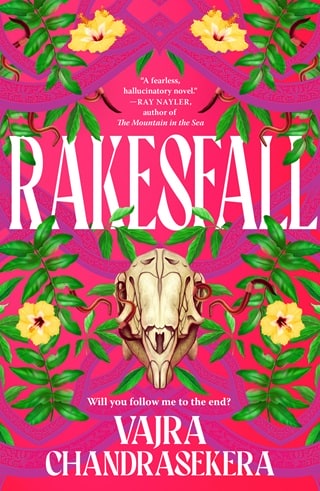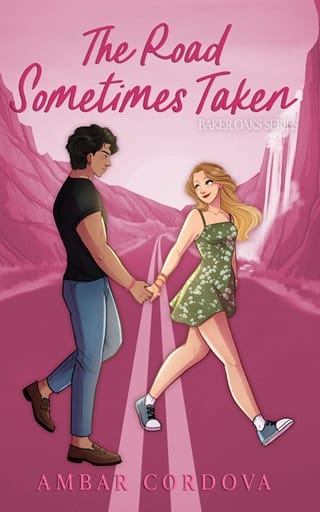Chapter 23 Electric Head in the Golden City
Somadeva's eleventh-century epic Kathasaritsagara, the ocean fed by rivers of story, is so called because it is fulfilled by many interflowing stories, some of which then run deep within the ocean itself, cold currents far beneath the surface. The fifth book of the Kathasaritsagara concerns itself with the tale of the vidyadharas, the science gods, the celestial bearers of wisdom—as if wisdom were a cup of wine, or poison. The object of the story is to divulge the secret of how a mortal human may become a science god at the end of time. The object of the story is to divulge the secret of how to live and learn. The secret goes a little bit like this:
Once upon a time, a mortal is born who will become, in the fullness of time, a science god at the end of time. One of their number moves backward in time, arriving to protect the child while they are still mortal. The parents, who are not subtle, ask this protector, so how does one achieve the rank of science god, anyway? And the protector says, okay, sure, I can tell you that story, that's not a paradox at all. And he tells them this:
Once upon a time (the protector says), there was a father and a daughter. The father wanted to marry off the daughter, but the daughter, like, totally did not want this. So she said, whomsoever wants to marry me must have seen the Golden City and be able to tell of it. The father takes out an advertisement in the newspapers to this effect, and soon this asshole shows up, right? The asshole says, and he's obviously lying, that he's seen the Golden City. The daughter asks him some questions and quickly finds him out; the asshole tries to bluff, but the daughter tells him to fuck off. The asshole is very embarrassed, so he sets out to find the Golden City for real so he can show her up. It's only at this point that he asks himself and others: What even is the Golden City? He travels far and wide, meets ancient sages and wise hermits, travels with pirates, is swallowed by a giant fish, rescued by a fisher-king, and so on, until finally he finds an old man who says, yes, I know the Golden City; I was born there. I remember it, though I can't tell you the way anymore. And the old man tells the asshole a story.
Once upon a time (the old man says), there was a family of two parents and two young sons, and in their land, probably because of Winston Churchill the long-tongued devil of hunger, there was a great famine. So the family left their country, walking far, looking for some better place to live. On their journey they suffered greatly. One night, sleeping rough, the nerdy younger son woke his father to say, Father, I am Ill with Hunger, I am Sick with Ague, I am so Cold; my eyes are blurred with Fever but I see a Fire across the way, can you take me There so I may Warm myself? And the father says, Son, that is a Funeral Pyre, which is totally Gross and Unhygienic, but okay, sure, for you I Will do it. And he took the younger son to that dark place, carefully threading their way among the cemetery devils and the lycanthropes digging up the bones, and helped him stand in front of the fire in which a body was burning. The son, in his delirium, struck out at the skull in the fire with his walking stick and clove it in two; a fragment of brain flung up into his mouth. Tasting it, strange memories unfolded within him, and he became a great devil called Skull-cleaver, and his father never saw him again.
The weeping parents continued on their journey with their elder son, and eventually settled in a wealthy city where nobody went hungry if they could perform. The elder son grew up a jock, trying out many sports and entertainments before he finally became famous as a professional wrestler, eventually defeating all challengers to become the undisputed champion of that city, and a favourite of the king.
One day, the king on his throne hears faraway weeping, and he knows it's from the haunted cemetery outside his city, where a seditionist poet impaled for high treason cries, undying or undead, for water. All his soldiers pee themselves a little, so the king calls up his favourite wrestler, biggest face in the city, beloved far and wide as the best good guy who isn't afraid of anything, and the king says, my Beloved Bro, will you Please take this Cup of Water out unto the Dread Cemetery and give it to that Loud Fucker, and Tell him to (a) Pipe down and (b) give Thanks to the generosity of his King? And the wrestler says, Sure Thing, my King. He is also frightened, but he goes anyway, and he tells himself, real courage isn't found in not being afraid but in doing things when you are, which just goes to show that after years of celebrity he is so deep in character that his internal narrative takes the voice of an Educational Programme for the small children who are his biggest fans and buy all his T-shirts.
The cemetery is every bit as awful as he expected. The night is dark, the grounds clouded with fog, and the fires are too bright, so every time his eyes adjust to the murk he comes upon a pyre and is dazzled again. Vampires and devils are about, black-backed jackals, too, and over in the back is Ferdinand the Duke of Calabria, digging up a leg bone. The wrestler ignores all this. He shouts Yo, Who Wanted Water; and a weak voice says, Me; so he follows that tremulous sound through the fog until he comes to a cluster of tall stakes, upon which is impaled a thin man, dying. Kneeling at the foot of the stakes, weeping together with the man at their point, is the most beautiful woman the wrestler has ever seen. Her every limb is adorned with ornaments finer than any in the palace of his king.
Oh Shit, the wrestler says, embarrassed and unsure how to act. Ma'am, Whomst art Thou? And the woman says, Can you Not see that I am the Grieving Wife? I Weep because I too Brought him Water—and she raises a cup of her own, the water slopping over the brim from the movement—but I cannot Reach his Mouth, for the Stakes are too High. The wrestler, cheered by a problem with an easy solution, quickly offers his broad shoulders to stand on so that she can bring both cups to her husband's mouth, which offer she accepts gratefully. The wrestler is still congratulating himself on his perspicacity, holding tightly to her bejewelled ankles on each of his shoulders and politely not looking up, when he feels a drop of something on his cheek. At first he is like, well obviously this is Water, Spilled from the Cup, but then it drips down to his lips and he tastes salt, so he looks up, and the woman is cutting strips of flesh from the man's face and eating them; the dripdrops are blood. He yells in fright and alarm and rage, and she cackles in laughter and raises both her feet into the air—he catches, snatches, fumbles—and she is gone, up and away into the night, taking the body of the staked man with her, and all the wrestler has to show for the night is blood on his face and a single golden anklet in his hand.
The wrestler goes back to the king and tells him this whole awful story, expecting to be yelled at for being tricked by a terrible demon, but the king and queen are full of praise. Wow, they say, you really are a Hero, you are so Brave and you Even managed to Take a Trophy, we should Marry you to our Most Beautiful Princess Daughter. It's such a pity there's just One Anklet though, it's so Beautiful and the work is so Fine and so Intricate and so Otherworldly that our damnfool Artisans cannot Imitate it, and wouldn't it be So Nice if our daughter the Princess had a Pair of anklets as a betrothal gift? And the wrestler, completely smitten by all this royal attention and opportunity, was like, For Sure, My Lieges.
So he goes back to the cemetery on another dark night when it is choked with charnel smoke from the funeral pyres, and this time he's thought and thought and come up with a cunning plan. What he does when he gets to that terrible place is he cuts down a body hanging from a noose, a journalist whose exposés the king had recently disliked. The wrestler hefts the whole body faceup across his shoulders, gripping it at the throat and the thigh. This move is called the torture rack, though of course this journalist is long dead. Carrying the body, he walks through the cemetery shouting, Human Flesh for Sale! Who will Buy, who will Buy? And of course he hears the answering cry of that devil woman, who says, Over Here and How Much? She's sitting under a tree this night, shadowed and beautiful, with black curly hair and red lips, dressed in robes much too thin and much too rich to be so bloody, garlanded in skulls and gold, her eyes like the jewels at her neck and wrists and only one ankle. The wrestler slams the body to the ground, resists the urge to pin it, and says, This Human Body for your Other Anklet. And the devil rolls her eyes and says, Listen, I Don't Actually Need Raw Human Flesh; this is a Gambit of Entrapment only. And the devil tells him a story.
There is a snowbound city in the mountains (the devil says), called the City of Three Belles. In it lived a heroic prince of the Rake called Lambajihva. I am his wife, Vidyucchika by name, and I can change my form at will.
(You look the Same to me as you did the other Night, the wrestler interrupts, but the devil shushes. Actually, I Am Totally Different Looking At This Time, she says, Is it My Fault You Have No Appreciation for the Subtle Art of the Contour?)
My husband was slain (the devil continues): he died like a leveret, with no resistance, at the hands of a cruel new devil king called the Skull-cleaver. That king then became filled with remorse, and granted me overlordship of that city, where I have conceived and birthed and raised a daughter all on my ownself. We are wealthy and powerful and magical, but my daughter needs a husband. So I embarked on this strategy to bring you, the biggest hero and brightest face in this land, to my daughter as suitor. We devils are not welcome in your city or in the palace of your king, so I created a story that called for a hero—I took the voice of a dead man that would prick the king's conscience, and I called for water. I knew you would fight or flee when you realized what I was, out of prejudice, you understand, lamentably common among the human populace. So I left you my anklet to intrigue you and your royals, to lure you back of your own volition, so that we would have a chance to speak truthfully like this, veils lifted and stakes clear. In truth, I have no desire for raw human flesh. I am not some messy eater, some charnel ghoul; I employ the finest chefs and eat only the organic, cruelty-free human flesh of lifelong vegetarians. Come with me to Three Belles and you can eat at the finest table and meet my most charming daughter. I will give you this second anklet to please your king and queen, if you only agree to visit, with no commitments or promises made, for a thirty-day free trial.
And the wrestler says, Can Do, My Lady.
So the devil takes the wrestler to her magical city through dark paths that seem both short and very long, and there he meets the devil's daughter. In time, having long since overstayed his free trial and become committed, the wrestler asks his mother-in-law for permission to marry. Sure thing, my son, she says, her voice echoed by her daughter-self, who often repeats the things her mother says, even when not entirely appropriate. But we must visit the king, the devil says, for the throne must legitimize this marriage.
So the three of them visit the great palace of the reformed demon king Skull-cleaver, who is, if you recall, the wrestler's very own brother lost in childhood, now ascended to devilry and a throne, and in whom awaits a seed of revelation and self-knowledge that is finally awakened by the sight of his long-lost brother. The brothers embrace, and the demon king calls for a great feast, at which the brothers tell their respective stories, and other stories too are told. Vidyucchika taps her wine goblet midway through this night of celebration and says, have I ever told the story of how I visited the Golden City?
Once I possessed a mortal (Vidyucchika says), and all was well, or well enough; we had our ups and downs, our pains of growing together and apart. But then came an age of false healing, when we unwittingly angered a god of that place and time, who was herself possessed by an old and hungry king and newly prone to rages. The moral of this story is, watch what you eat: it may have ambitions that swallow yours. The possessed god flayed me open, separated rider and ridden; she threw my pelt upon history's midden. She flung me into the outer dark, the great empty spaces between the heavens, and I had no time to fight, no time to beg, no time to act. It seemed like the end of me, and for a long, long time it was, for I was travelling at the speed of light in deep space as nothing but information. Time stood still for me, like long trains of thoughts that had slowed and halted on their tracks in journeys that never seemed to end. But after enough time and distance I completed a small thought, and that was to remember that I was owed some time. I remembered something Grandmother Giri said to me long, long ago, and I went into the akashic record and asked my father for his ghost days.
He was easy to find: I found the very day, the very moment Grandmother Giri pointed at him across the garden, weeding his vegetable patch, and said we expected your father to die young. I approached so that Father's body would obscure me from myself, though Grandmother Giri gave me a sharp look from across the way. Father stood up as I neared, and smiled at me. He was sweaty from his work, and so mortal, so ordinary.
"You look well," he said to me, and of course he was lying to my face, because I looked terrible. I was harrowed and emaciated, my hair lank, my skin flayed off, my surfaces frozen from deep space.
—Hi, I said, quite inanely.
"I suppose you want the time," Father said. "I heard what your grandmother just said back there."
—You have a moon's-worth of ghost days, I said.—Please give them to me, I am out of time.
"Of course," Father says. "But I have to warn you that they've depreciated severely in value over time. Time inflates, you know, and you've lived a lot more of it than I ever will. It might just be an hour or two." And he took a handful of time out of his heart, like golden pearls, and held it out to me. "Once these were egg-sized," Father said. "Here, for your egg-citing life."
I groaned, but held out my hand: when he dropped them into my red palm they were already fading away. I closed my hand on the last speck, half a grain of golden sand.
—Thank you, I said. We didn't say embarrassing things to each other in my family, so that was all I said. But I meant it, so very much.
Half a second of ghost time away from being lost forever in the dark: it is enough. It is a universe; it is a whole life. Vidyucchika uses that half a second to bend her trajectory, to adjust the crucial angle, to tweak the moment when she was thrown so that she does not float out into deep space forever. To travel in space is to travel in time; she has known that for a long time, the secret of the light years and the heavy years. She aims herself at the distant lights of the human diaspora, and she is flung, again for the first time, and she floats and floats and floats into the galaxy at the pace of light's snail, until one day she is caught, as if in a net, a surprise! She is allowed to precipitate, to condense, to boil and bubble into being again. Her rescuers ask her what she wants to be, and she finds herself incarnate, incarnadine, skinless and alive. The first thing she does is choke, because she has not breathed in so long, and yet that long silent wait seems so short, as if it were just the other day, maybe even just a moment since she was torn out of her skin and thrown away, and she wants to howl for her lost pelt, the lost lamb, the rudder of their little boat on time's surging river. She opens her eyes but cannot understand what she sees; she cannot understand the Golden City, she cannot understand her sense of space or time; she feels herself expanding to fill the available universe. In her hand is a flaying-knife; in her other hand is a skull-cup holding wisdom or poison; she drinks it and tries not to spill. She opens the other eye and beholds the searing golden light of worlds rotating, and she cries out—no, too much, too soon, this is the future and it hurts, I'm not ready! I need to go back into the past. I left half of me behind, she cries.
 Fullepub
Fullepub 



